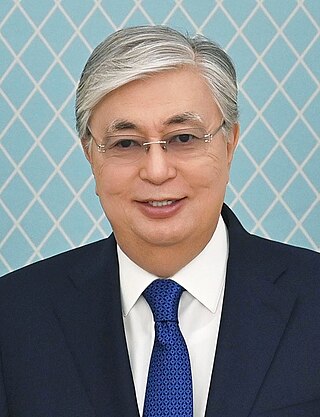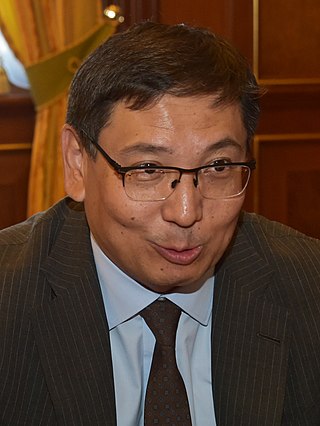
Foreign relations of Kazakhstan are primarily based on economic and political security. The Nazarbayev administration has tried to balance relations with Russia and the United States by sending petroleum and natural gas to its northern neighbor at artificially low prices while assisting the U.S. in the War on Terror. Kazakhstan is a member of the United Nations, Collective Security Treaty Organization, Organization for Security and Co-operation in Europe, North Atlantic Cooperation Council, Commonwealth of Independent States, the Shanghai Cooperation Organisation, and NATO's Partnership for Peace program. Kazakhstan established a customs union with Russia and Belarus, transformed into the Eurasian Economical Community then in 2015 into the Eurasian Economic Union. President Nazarbayev has prioritized economic diplomacy into Kazakhstan's foreign policy.

Nursultan Abishulych Nazarbayev is a Kazakh politician and military officer who served as the first President of Kazakhstan, from the country’s independence in 1991 until his formal resignation in 2019, and as the Chairman of the Security Council of Kazakhstan from 1991 to 2022.

Kassym-Jomart Kemeluly Tokayev is a Kazakh politician and diplomat who has served as President of Kazakhstan since 2019. Between 20 March and 12 June 2019, he served as acting president after the resignation of Nursultan Nazarbayev, who had been president for nearly three decades.

The Calvert Cliffs Nuclear Power Plant (CCNPP) is a nuclear power plant located on the western shore of the Chesapeake Bay near Lusby, Calvert County, Maryland in the Mid-Atlantic United States. It is the only nuclear power plant in the state of Maryland.

The "Auyl" People's Democratic Patriotic Party or simply as Auyl ("village"), is a political party in Kazakhstan. It was originally founded by Gani Qaliev on 30 January 2000 as the "Auyl" Peasant Social Democratic Party before eventually merging with the Party of Patriots of Kazakhstan on 5 September 2015. The party is currently led by Senator for Turkistan Region Äli Bektaev from August 2015. With a membership of around 300,000 people, Auyl has participated in every Kazakh parliamentary election since 2004 and nominated presidential candidate Toleutai Raqymbekov in the 2019 presidential election. It first entered the Mäjilis at the 2023 legislative election, winning eight seats and becoming the largest opposition party.

Human rights in Kazakhstan are uniformly described as poor by independent observers. Human Rights Watch says that "Kazakhstan heavily restricts freedom of assembly, speech, and religion. In 2014, authorities closed newspapers, jailed or fined dozens of people after peaceful but unsanctioned protests, and fined or detained worshipers for practicing religion outside state controls. Government critics, including opposition leader Vladimir Kozlov, remained in detention after unfair trials. Torture remains common in places of detention."

The Lungmen Nuclear Power Plant, formerly known as Gongliao and commonly as the Fourth Nuclear Power Plant, is an unfinished nuclear power plant in New Taipei City, Taiwan. It consists of two ABWRs each of 1,300 MWe net. It is owned by Taiwan Power Company (Taipower).

Erbolat Asqarbekūly Dossaev is a Kazakh politician serving as an äkım of Almaty since 31 January 2022. Prior to that, he was a National Bank of Kazakhstan chairman from 25 February 2019 and served as a Deputy Prime Minister from 29 August 2017 to 25 February 2019. He served as the Minister of Finance from 16 June 2003 to 5 April 2005, headed the Agency for Regulating Natural Monopolies, and later as the Health Minister from 5 April 2004 to 20 September 2006. In January 2013, Dossaev was appointed head of a reorganized Minister of National Economy.
Nuclear power is a major power source in South Korea, providing 29% of the country's electricity. The total electrical generation capacity of the nuclear power plants of South Korea is 20.5 GWe from 23 reactors, equivalent to 22% of South Korea's total electrical generation capacity.
Nuclear power in Taiwan accounts for 2,945 MWe of capacity by means of 1 active plants and 2 reactors. In 2015, before the closure of 3 reactors, they made up around 8.1% of its national primary energy consumption, and 19% of its electricity generation. The technology chosen for the reactors has been General Electric BWR technology for 2 plants and Westinghouse PWR technology for the Maanshan Nuclear Power Plant. Construction of the Lungmen Nuclear Power Plant using the ABWR design has encountered public opposition and a host of delays, and in April 2014 the government decided to suspend construction.

Kazakhstan–Russia relations are the bilateral foreign relations between Kazakhstan and the Russian Federation. Kazakhstan has an embassy in Moscow, a consulate-general in Saint Petersburg, Astrakhan and Omsk. Russia has an embassy in Astana and consulates in Almaty and Oral.
This is a history of nuclear power as realized through the first artificial fission of atoms that would lead to the Manhattan Project and, eventually, to using nuclear fission to generate electricity.

Independence Day of Kazakhstan (Kazakh: Қазақстан Республикасының Тәуелсіздік күні,is the main national holiday in the Republic of Kazakhstan, celebrated annually on 16 December.

Snap presidential elections were held in Kazakhstan on 9 June 2019 to elect the President of Kazakhstan following the resignation of long-term President Nursultan Nazarbayev in March 2019. This was the sixth presidential election held since Kazakhstan's independence. The elections were not free and fair, and were widely denounced as a sham. Acting president Kassym-Jomart Tokayev of Nur Otan won the election.

Presidency of Kassym-Jomart Tokayev began on 20 March 2019, when he assumed office shortly after resignation long-time President Nursultan Nazarbayev; as a Senate Chairman, Tokayev became the Presidential Designate in accordance to the Constitution and would serve as an acting head of state. After declaring snap presidential elections Tokayev, endorsed by Nazarbayev, become the candidate for the ruling Nur Otan party and swept 71% of the vote in the race, thus becoming officially the 2nd President of Kazakhstan. After being inaugurated on 12 June 2019, Tokayev pledged to uphold many of the previous policies by Nazarbayev and at the same time, continue and accelerate social and political reforms.

A constitutional referendum in Kazakhstan, locally called the Republican referendum, was held on 5 June 2022. It was the third referendum since Kazakhstan's independence in 1991, and the first since the 1995 referendum that established the current constitution. The amendments followed violent civil unrest in early January caused by worsening economic conditions and subsequent calls for rapid political reform. The referendum changed 33 of the document's 98 articles. Political commentators assessed that amendments would lessen the influence of the executive branch, grant more powers to the Parliament, and eliminate the powers that former president Nursultan Nazarbayev had retained after resigning from office in 2019.

Snap presidential elections were held in Kazakhstan on 20 November 2022 to elect the President of Kazakhstan. This was the seventh presidential election since Kazakhstan's independence from the Soviet Union in 1991. Incumbent president Kassym-Jomart Tokayev, an Independent, was re-elected for a second term in a landslide, receiving 81% of the vote. His closest challenger, Jiguli Dairabaev of the Auyl Party, received just 3% of the vote, marking the first time since 2015 that all candidates other than the incumbent president failed to garner 5% or more of the vote. This was the first election since 1999 in which the "against all" option was included on the ballot paper. It received 6% of the total vote. Voter turnout was 69%, the lowest ever in a Kazakh presidential election.

Incumbent president of Kazakhstan Kassym-Jomart Tokayev originally announced his candidacy during the State of the Nation Address on 1 September 2022. From there, he also proposed a constitutional change regarding the presidential term office to be extended for a nonrenewable seven-year term. Tokayev was nominated for presidency by the People's Coalition on 6 October 2022, which consisted of several major pro-government political parties and public associations in support. He was officially registered as a candidate on 12 October by the Central Election Commission after garnering a total of 399,809 signatures.
Local elections are set to be held in Kazakhstan on 19 March 2023 to elect a total of 3,415 seats to 223 mäslihats across all regions of Kazakhstan. The local elections will be held alongside 2023 legislative elections and were held under the basis of mixed-member majoritarian representation, which for the first time since 2016 reinstated single-member districts that were previously abolished in 2018.
New Kazakhstan is a concept developed by President Kassym-Jomart Tokayev that represents a forward-looking national aspiration for progress, renewal, and modernization in various aspects of Kazakhstan's governance and society. It was first proposed in 2022 following the January events as a response to the societal challenges and demands for change during that period.












